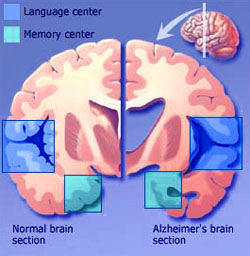Alzheimer's can't be cured, but forgetfulness can be staved off
 Berlin - In its initial stages Alzheimer's Disease causes people to forget little things such as names or where they put their keys.
Berlin - In its initial stages Alzheimer's Disease causes people to forget little things such as names or where they put their keys.
Over time these memory lapses increase. Alzheimer's is a progressive, incurable disease of the brain whose cause remains unknown. But experts are hopeful that the right strategy can greatly delay the disease's progress.
In Germany for example 1.2 to 1.5 million people in a population of 82.3 million suffer from some form of dementia. An estimated 60 per cent of them have Alzheimer's, German authorities report.
"The estimated number of cases is almost certainly higher," said Elisabeth Stechl of Berlin's Charity hospital.
Though the cause of the disease is still unknown, researchers believe genetics and other external influences play a role. The age at which people become at risk is 65.
"In people with Alzheimer's dementia the brain cells that are responsible for activation and mobilisation of the brain fail," said Professor Guenther Deuschl, director of the neurological clinic at Schleswig-Holstein university clinic in Kiel.
The disease progresses in different stages. Initially, it is just a few cells, ultimately more and more fail. And the sufferer has to deal with the knowledge that there is no cure.
"But there is a lot that any person affected by the disease can do to slow the progress of the disease," said Professor Hans Georg Nehen, director of the geriatrics clinic at Elisabeth hospital in Essen.
After being diagnosed the individual need not fear that they soon will go crazy or become certifiably insane. "Many people don't know that dementia begins with the slightest of changes in mental capacity," said Stechl. Ten years or more can pass between the first memory problems and the serious stages of the disease.
"Very effective medications meanwhile have been developed," said Deuschl. Even more effective than drug therapy is the action taken by the patients themselves.
"The earlier Alzheimer's patients become active, the higher the chances of stemming the advance of the disease," said Stechl. Physical and mental activity protect against the deterioration of the brain. Whether the physical activity is taking regular walks, swimming, dancing or cycling doesn't matter.
"Physical activity strengthens not only the body, but also supports and promotes the mind," said Deuschl. However, people who only solve sudoku puzzles aren't doing enough. The brain needs as many incentives as possible, and variety keeps the brain on the go - doing crossword puzzles, listening to music, having a discussion with friends, writing stories, going to the cinema.
It's also important for Alzheimer's patients to keep stress to a minimum because tension causes people to forget even more, said Nehen.
"The most effective way to counter forgetfulness is to enjoy life and the things that make us feel happy as much as possible," he said.
Memories are more intensive when they are connected with emotion. Sharing time with good friends, going on special outings and participating in an exciting hobby - people should follow their passion. (dpa)